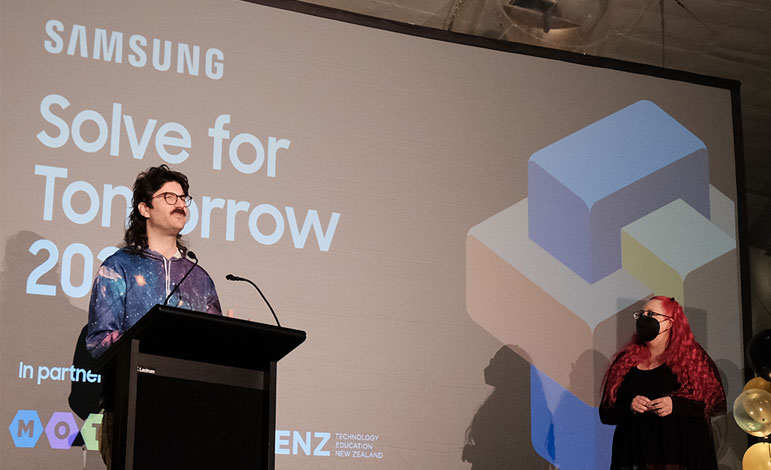
<p><em>By Dr Joel Rindelaub</em></p>
<p><strong>When I was a teenager, my biggest decision was whether or not to grow a mullet for the school dance (spoiler: I did). These days? Generation Alpha kids are out there designing tech to clean waterways, reduce waste, and tackle global challenges before they’ve even hit NCEA.</strong></p>
<p>As someone who’s spent years elbow-deep in lab work (and, yes, occasionally sniffing microplastics in the name of science &#8211; not recommended), I’ve seen my fair share of gloomy environmental data. But despite all that, I’m feeling hopeful.</p>
<p>And no, it’s not just the lab fumes talking.</p>
<p>I’ve been fortunate to spend time recently with some of Aotearoa’s brightest young minds through Samsung’s Solve for Tomorrow competition &#8211; a nationwide STEAM initiative for years 7 &#8211; 13 that invites students to develop science, technology, engineering, arts and maths-based solutions to real-world problems. The competition has been designed to align with the teaching standards in your curriculum, making it easy for teachers to integrate into their work plans.</p>
<p>As a judge, I get the opportunity to examine entrants thought processes, wonder at their creative ideation and design thinking, and ultimately celebrate how Kiwi kids are engaging in their communities by identifying and solving problems.</p>
<p>And let me tell you, the kids are more than alright.</p>
<p>Last year we all looked to <a href="https://www.samsung.com/nz/solvefortomorrow/winners/?srsltid=AfmBOop1H9hFl0_mxgJyB4HmtuYJnMrWMdC6ggOdAcqo2Zb9cNnSCshL" target="_blank">Logan</a> from Christchurch. Recognising the the plastic pollution in his local area, he designed and 3D-printed a hyro-powered device to help remove rubbish and pollutants from waterways. It’s innovative, smart, and it works – a real-world solution developed by a student who just decided to give it a go and make a difference in his local community.</p>
<p>We see an incredible range of topics that students are engaged with. Entries range across using <a href="https://www.nzherald.co.nz/rotorua-daily-post/news/rotorua-teen-turns-ai-against-pest-wallabies-in-whakarewarewa-forest/QARVKVOGCVBA5MQ42COM4IG77M/" target="_blank">AI to help protect native wildlife</a>, to a standout that <a href="https://www.stuff.co.nz/wellbeing/360675143/wellington-boy-12-creates-ai-pill-bot-stop-grandmother-taking-wrong-medication" target="_blank">explored assistive tech</a> to support people with different needs. It’s always a challenge to judge between the thoughtful, insightful ideas that these students show, each with such a different problem to solve.</p>
<p>The depth of their entries &#8211; identifying the problem, developing a prototype, adapting to stakeholder feedback, and presenting their ideas &#8211; shows a deep understanding of the design thinking process and engagement with the world around them. They care deeply about their communities and are motivated to make changes.</p>
<p>That’s something we can all take inspiration from.</p>

		<div class="tie-full-width-img">
			<a href="https://www.samsung.com/nz/solvefortomorrow/" target="_blank"><img class="aligncenter wp-image-33986 size-full" src="https://www.schoolnews.co.nz/wp-content/uploads/2025/06/Samsung_Solve_2.jpg" alt="" width="600" height="596" /></a>
		</div>
	
<p>We’re also seeing more and more environmental-led projects, like Logan’s Enviro-Saver, showing how much our students are concerned about climate change. With my research in environmental pollution, I’m looking forward to working with the next generation of chemists to bring new bold ideas to managing our air quality – and watching on as our Solve For Tomorrow superstars excel in other STEAM industries.</p>
<p>I genuinely believe today&#8217;s students are going to be the ones who make a change and save the world, and it’s a privilege to play a part in inspiring students to dream big for a better tomorrow.</p>
<p>I’ve always been a big science nerd who loved asking questions and figuring out how things worked. That curiosity took me from a high school lab in the US to a PhD in chemistry, and eventually to research labs here in Aotearoa.</p>
<p>But what I’ve always believed is that STEAM topics and innovation should be accessible. That’s what makes Samsung Solve for Tomorrow so exciting. It gives students a platform to be heard, to be taken seriously, and to apply design thinking in ways that could shape our collective future.</p>
<p>Students can’t do this alone and need the support and guidance of teachers and educators to help guide their creativity. You’re the ones helping nurture this mindset &#8211; the curiosity, the resilience, the problem-solving instinct. You’re not just preparing students for the future, you’re enabling them to lead it.</p>
<p>So yes, we’ve got a way to go to fix our planet. But if there’s one thing I’ve learned from these brilliant young minds, it’s this: hope is still alive. It’s learning about nitrate levels. It’s sketching out circuits in its lunch break. It’s standing in front of a classroom, explaining an idea that just might make a difference.</p>
<p>Let’s keep listening. Let’s keep encouraging. Because the next breakthrough might be happening right now in your classroom.</p>
<p style="text-align: center;"><div class="tie-center-button"><a href="https://www.samsung.com/nz/solvefortomorrow/?srsltid=AfmBOorhRpS5TXgtMkasGwwIo0kj9alAKGY_obh6Y3lz_5X_UIZKySjK%20%20" target="_blank" class="shortc-button medium gray">ENTER NOW</a></div>
<p><a href="https://www.samsung.com/nz/solvefortomorrow/?srsltid=AfmBOorhRpS5TXgtMkasGwwIo0kj9alAKGY_obh6Y3lz_5X_UIZKySjK%20" target="_blank"><img class="size-full wp-image-33993 aligncenter" src="https://www.schoolnews.co.nz/wp-content/uploads/2025/06/SAM_2025_04_School-News-Banner_728x90_AP_V1.gif" alt="" width="728" height="90" /></a></p>

In the ever-evolving landscape of education, BUILTsmart stands as a pioneer in delivering innovative, high-quality…
A North Island high school has replaced bulky metal key sets for single electronic access…
Investing in covered outdoor spaces requires careful consideration of various factors to ensure their effectiveness,…
This website uses cookies.